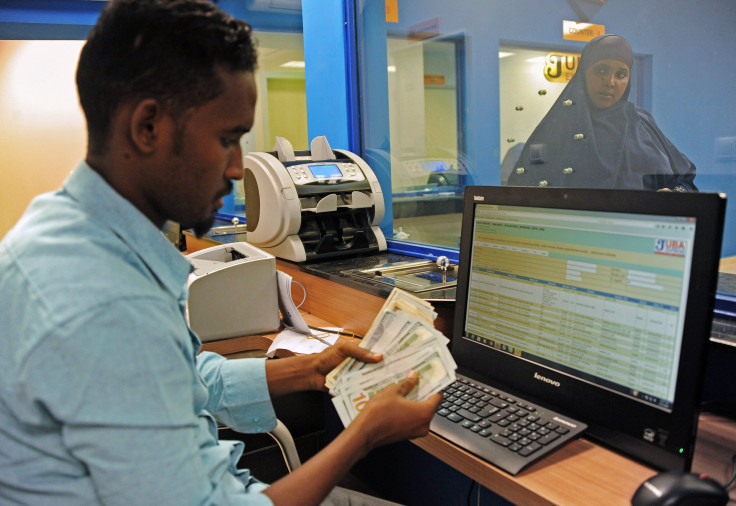Amid African Migrant Crisis, EU To Cut Remittance Fees In 15 Years

Poor families in sub-Saharan Africa for decades have desperately relied on money sent home from loved ones working overseas. Whether sent in an envelope or through an electronic transfer, these remittances can put dinner on the table and send a child to school.
Comparatively high transfer fees, however, have long eaten away at that hard-earned cash. It costs about $25 for an African migrant to send a $200 remittance to his or her family in sub-Saharan Africa -- money that could be spent on much-needed necessities such as food, clothing and healthcare. European leaders said Thursday this is set to change -- but not for another 15 years.
As part of a $1.9 billion bid to curb Europe's continuing migrant crisis, European governments have vowed to cut remittance fees to below 3 percent by 2030. The move is Europe’s answer to Africa’s concern that a clampdown on migration will stop this stable source of income for impoverished Africans. But experts said the 15-year goal is far from ambitious and will have little impact on stemming the flow of African migrants arriving on Europe’s shores.
“These are people who are working in tough jobs, earning real money and being ripped off by cartellike pricing,” said Kevin Watkins, executive director of the Overseas Development Institute, a London-based think tank. “It's honestly one of the great financial outrages of our time."
African migrants face the highest remittance fees globally. These excess charges cost the entire African continent $1.8 billion each year, experts said, which is enough money to fund primary-school education for 14 million children in the region or to provide safe drinking water for 21 million people.
At the same time, global remittance flows to Africa are now larger than official development assistance from richer countries, proving to be a more reliable external source of income than private capital in the developing world. Over $30 billion in remittances is sent to sub-Saharan Africa each year by some 30 million African migrants living in the diaspora. Remittances to Africa fuel 5 percent of the continent’s GDP, with the payments accounting for over 20 percent of GDP in countries like Liberia and Gambia, according to a recent World Bank Group report.
More than half of the citizens in the developing world live on less than $1.25 per day, and moving to countries like France or Italy can multiply that income by 20 or 30 times, experts said. Sending money from these countries to Africa is relatively easy via electronic transfers, but there are charges at each step of the way. An African migrant wishing to send money home must consult a transfer agent, who will charge a fixed-rate fee plus a money transfer fee. For many African nations, that costs around 12 percent of the remittance amount. When the money transfer arrives in Africa, the remittance can be retrieved through another agent, who could charge yet another fee.
"This is money earned by people who are trying to do their best to help their families back home. It goes directly into the pockets of their family members and the local economy," Watkins said.
At least 350,000 people have risked their lives across the Mediterranean Sea this year in search of a better life in Europe, according to the International Organization for Migration. Most of them are coming from conflict-torn countries in the Middle East and Africa. Some are fleeing deadly war or brutal insurgency in Somalia, Libya and Nigeria, while others are running from rampant unemployment in South Africa or a repressive regime in Eritrea.
"Many migrants are not leaving for economic reasons; they're fleeing because they've suffered from human rights abuses," Leslie Lefkow, deputy director for Human Rights Watch’s Africa Division, said.
European leaders, however, failed to address these core reasons for migration at a two-day summit in Malta this week. That means slashing remittance fees won't necessarily stop Africans from migrating to Europe, and in some cases, it may slightly increase incentives if Africans abroad can more easily send money back home, experts said.
"I would be fully in favor of cutting the cost of remittances. Whether cutting them is enough is another question," Oliver Bakewell, director of the University of Oxford’s International Migration Institute, said. "I find it hard to see how cutting the cost of remittances will change the flow of movement."
EU Africa drive to cut cost of sending remittances home
https://t.co/7yov3gfzQ8 #refugees pic.twitter.com/sWnRz87rVq
— Tony Addison (@TonysAngle) November 9, 2015It's not yet known exactly how E.U. states plan to reduce remittance fees, and there are fears governments will cut the costs at the expense of sending less foreign aid to Africa. Recent research by relief organization Oxfam International shows that $1.3 billion in remittances are sent to Somalia each year, almost double the $715 million the Horn of Africa country received in humanitarian assistance in 2013. However, Somalia -- and much of Africa -- still relies on foreign aid.
“Remittances have shown to help development at the community level. We have to be clear, though, that there’s no substitute for regular development assistance,” Sara Tesorieri, E.U. conflict and humanitarian policy adviser at Oxfam International, said.
Instead of the proposed plan, the European Union should immediately begin instituting regulatory reforms that increase competition in the money transfer industry -- which is dominated by Western Union and Moneygram -- lower prices and improve transparency in the remittance market, experts said. They claim European financial regulators could easily drive down remittance fees to below 3 percent within a few years.
“These companies are taking big cuts out of people’s hard-earned income,” Watkins said. “Europe’s response is, 'After another 15 years of this, we’ll try to drive down the transfer cost to what it should be today.'”
© Copyright IBTimes 2024. All rights reserved.











